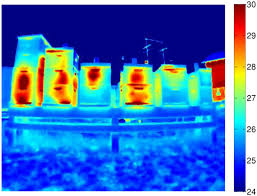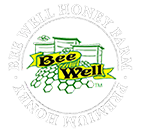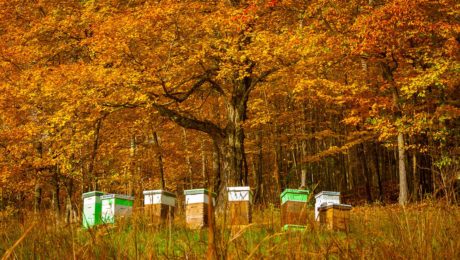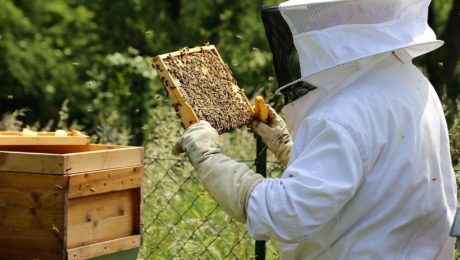What is the best way to get started as a beekeeper? The first step in your journey may be to choose a source of bees! When buying bees, you will be faced with the decision of purchasing package bees vs nucs. Both choices have advantages and disadvantages.
Package Bees
Thousands of packages of honeybees are sold each year. The most popular size is a 3# (weight) package of bees with a young mated queen. They are transported inside a small wire/wooden box with a can of sugar syrup to feed them on their journey.
Package Bees are the most economical and readily available source of bees. Generally available early in the Spring season, package bees are often preferred for beekeepers who want to get started early in the season.
Nucs
Nucs (also know as nucleus colonies) are small starter bee colonies. A nuc usually consists of 5 frames of bees (including drawn comb, honey and brood) and a mated queen. Not all nucs are created equal and when purchasing you should be clear on the size of the colony (# of frames) you are purchasing.
Which is better – packages vs nucs ?
Which is better for the new beekeeper? Packages vs nucs? Unfortunately, there is no clear answer to this question and the best answer will depend on the genetics of the bees involved, the climate/geographic location and the management style of the beekeeper.
Packages vs Nuc (the nitty-gritty)
Package Bees are more economical, less prone to spread pests or diseases (because no honeycomb is involved), and are more readily available. They are slower to build up a working population and have to go through the queen acceptance procedure.
Nucs – Nuc colonies are more expensive than packages of bees. They include a drawn honeycomb, some brood, and bees to cover the frames. Their mated queen will already be laying and accepted. This gives them a jump start initially over package bees. However, the presence of a drawn comb also brings with it the opportunity for pests and disease.
Both package bees and nucs are a great way to get started in beekeeping. Bee Well Honey Farm has been providing bees to area beekeepers for more than 20 years. Always purchase your bees from a reputable dealer and this will help ensure that you get off to the best start possible.
Becoming a Beekeeper is an exciting journey that many people wait years to experience. Unless you are lucky enough to have a beekeeper in your family, you might find yourself exploring the possibilities during mid life or later. This is okay. Beekeeping can be a meaningful adventure for young and old alike. Even though the craft does involve hard work and some heavy lifting, you can learn management techniques to help lighten the load.
Becoming a Beekeeper involves not only an education in honeybee biology and maintenance but also an understanding of natural local botany and climate conditions. Good beekeepers need to know when the food providing plants will bloom in their area. Weather conditions can affect honeybee colonies significantly and beekeepers must be prepared to step in when conditions warrant.
Those most likely to succeed will prepare well in advance of actually receiving the honeybees. Selecting a proper location, assembling equipment and learning the basics of honeybee management will help you to become a beekeeper worthy of the name. Remember you want to become a successful beekeeper not a “bee haver” .
Beekeepers in the Summer Heat
The summer heat has arrived with a vengeance. Those beekeepers who are new to the profession are getting to experience just how hot it gets here in South Carolina while wearing a beesuit. Yes, unfortunately sweating goes hand in hand with bee hive management during the summer months. One thing the South Carolina beekeepers need to be aware of is a possible change in temperament of your bee colonies.
That sweet colony of honeybees that you have nurtured from a small package back in the early Spring has grown into a massive colony. With that size comes strength and it is natural for a larger colony to be a bit more defensive than a small one. Lets add to this size issue, the fact that the colony now has brood to protect and honey stores. The bees “know” that the main harvest time is over and they are already starting to prepare for Fall/Winter. 
Now we add the heat ! Bee colonies “in general” tend to be more defensive during really hot weather ! Well, are you surprised – it makes humans grumpy also. So it might be a good idea to postpone beehive management, until the heat wave breaks. If you must go into the colony be sure to wear appropriate gear and take your smoker.
The Bee Well Team
Beekeeper’s Supplies and Education – Important Parts of a fascinating hobby
One of the most important facets of becoming a beekeeper is the beekeeper’s supplies and education. These elements are considered long before the bees ever arrive. At least this is the optimum way to become involved in beekeeping. Americans have enjoyed the hobby of beekeeping ever since the colonists first arrived – some bringing colonies of honeybees with them in the 1600’s.
Today the hobby of beekeeping is seeing a resurgence in popularity brought on by the media coverage of large honeybee losses. Keeping honeybees has changed a lot in the last 30 years. It is the intelligent approach to beekeeping that is most likely to yield good results. Many catalogs contain pages and pages of Beekeeper Supplies that can be overwhelming. Proper Beekeeper education can help the new hobbyist prepare for and mange their colonies.
Bee Well Honey has provided a full line of beekeeping supplies for years. We have everything you need to get started from beginners books to wooden ware and even the bees themselves. After a very successful event in the Fall of 2014, we will be offering a one day Beekeeping Bootcamp in the Spring of 2015. This one day class will feature lecture time and field time in actual hives. Date and price to be determined.Are you ready to dive into beekeeping ?
Order your bees NOW for spring delivery. Order bees here
Want more information about the Beekeeper Boot Camp ? Email us at : [email protected]
The coolness of Fall is a delight to all beekeepers who have been suffering from humidity and sweat all during the long Carolina summer. Our beesuits that were resplendent, crisp and white in early Spring are now sweaty, smokey and possibly covered with dirt, wax, propolis and bee poop. (Unless of course you have laundered your suit periodically – as you should).
Hopefully you have checked your colonies to insure they have sufficient winter stores before the cold weather is here to stay. In Upstate SC, we have now experienced a killing frost- very little or no fresh nectar will be available for foraging. You may also be running out of time to feed them sugar water as they can not access it well during the cold. We encourage our customers to check the honey stores of their colonies in September-October to give the bees their best chance of survival.
In our local area, it is not necessary to wrap beehives for the winter. In fact, most beekeepers leave the screen bottom boards open and only reduce the entrance to help the bees protect the hive as bee numbers dwindle over winter. You may start out will a large cluster in late Fall but the number of bees alive in January/February will be less as bees start to die before new ones are produced. A healthy cluster with plenty of food stores in the correct location should be able to maintain survival temperatures. The bees must consume food to generate heat. We are often impressed by beekeepers in colder regions who require extensive insulation to help their bees. One of our customers photographed this Alaskan beehive that was fully wrapped in straw against the winter cold. Luckily, this is not necessary here and you may even do more harm by trapping excess moisture inside the hive.
Honeybees practice homeostasis and maintain a nearly constant temperature during the winter but only inside the cluster itself. With the warmest temps in the middle of the cluster – it becomes cooler on the outside wall of bees and the temps inside the hive itself may get quite cold. Bees don’t need or require a heated space. Thermal imaging shows where the clusters are located in the boxes by the colors shown in the image.
So make sure your bees are ready for winter with good stores and we will hope for an early spring. 
One of the many debated topics among beekeepers is the issue of starting new hives with package bees or nucs. A package of bees is usually a 3# screen and wire cage containing about 10,000 bees and a mated queen (in a cage) with a can of syrup for the journey. A nuc (pronounced nuke) is short for nucleus colony. A nuc should contain 4 or 5 frames of complete honeycomb including bees, brood, honey, pollen and a mated and accepted queen. Both methods have advantage and disadvantages.
nucs. A package of bees is usually a 3# screen and wire cage containing about 10,000 bees and a mated queen (in a cage) with a can of syrup for the journey. A nuc (pronounced nuke) is short for nucleus colony. A nuc should contain 4 or 5 frames of complete honeycomb including bees, brood, honey, pollen and a mated and accepted queen. Both methods have advantage and disadvantages.
Package bees is probably the most common way to grow your apiary. Thousands of bee packages are sold each year in the US. Quality varies greatly so it is important to find a supplier that delivers healthy bees. Then the job of taking care of them is up to you the beekeeper.
Disadvantages of Packages:
the bees in the box are not usually related and have not yet accepted the queen included
the bees do not have any brood or stores in honeycomb
Advantages of Packages:
you will have no sealed brood for about 10 days (this can be a varroa mite break)
available earlier in the season
cost less than nucs
easier to deal with in the beginning, smaller cluster of bees, less propolis and sticky frames, all comb built will be new
Nucs are usually 4 or 5 frames of bees, complete honeycomb, stores, brood and an accepted queen. They are generally available a little later in the season and have a head start on packages purchased at the same time of year.
Disadvantages of Nucs:
Not all nucs are created equal and involve more variables than packages. When comparing costs you should have a complete understanding of how many frames you are getting and how full of bees those frames will be. Are the frames and comb old or new ? Is the comb completely drawn out or partial or just foundation ? Plastic or wax ?
Nucs can be hard to find when you want to purchase and are not always available early due to winter/spring weather. If the Spring is especially cold and nucs are slow to develop you may end up with nothing if you miss the package delivery dates.
Nucs with drawn comb and brood can more easily carry along pests such as (hive beetles, wax moths etc) and diseases.
Nucs are more expensive
Advantages of Nucs:
A good nuc colony has a head start over a package as it has brood, stores and drawn comb.
A queen that has been accepted by the bees and has already been laying.
Both methods are great ways to get involved in beekeeping for newbies or those wanting to expand their apiaries. We are taking orders for package bee now and the earliest dates will sell out. Place your order now !
https://beewellhoneyfarm.com/beekeeping-supplies/honeybees-sale/







